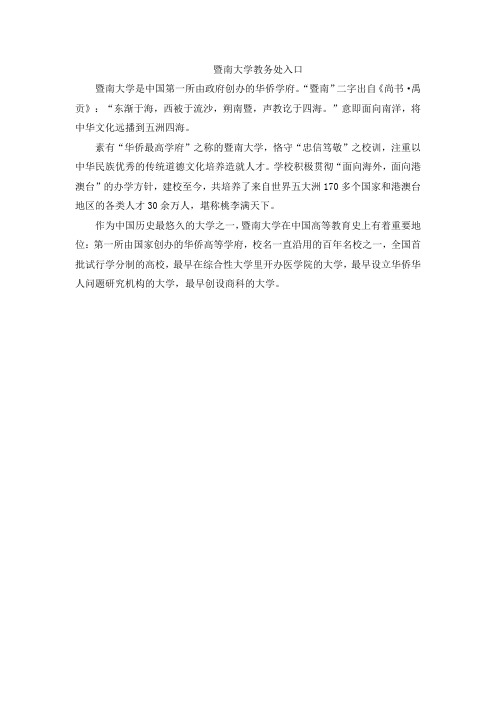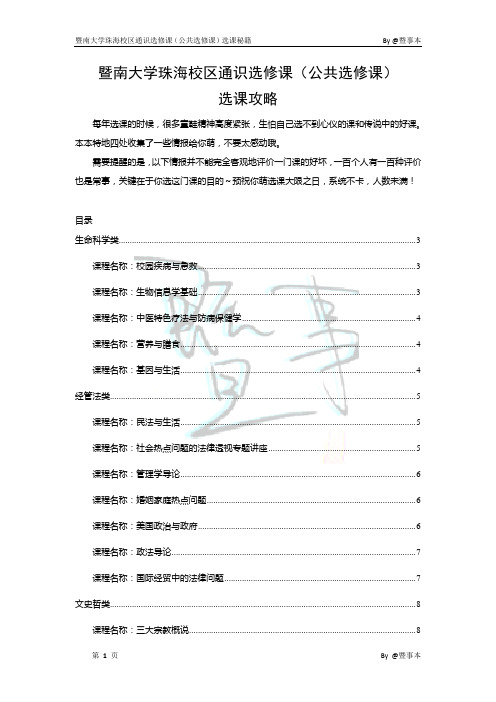JNC暑期学校-管理会计(暨南大学广州校区暑校)
暨南大学华文学院预科部

出版物刊名: 华文教学与研究
页码: F0002-F0002页
年卷期: 2010年 第3期
主题词: 暨南大学华文学院;大学预科;海外华人华侨;中国香港;教学部门;预科教育;中国大陆;
青年学生
摘要:暨南大学预科部始建于1925年,已走过了85年的发展历程。
1993年,暨南大学预科部归并于新成立的华文学院,由石牌校区移至瘦狗岭校区。
暨南大学华文学院预科部是专门为中国香港、澳门、台湾省及海外华人华侨青年学生报读中国大陆高校提供预科教育的教学部门,其综合办学规模、办学层次、课程设置规范和办学水平均处于国内领先地位。
暨南大学教务处入口

暨南大学教务处入口
暨南大学是中国第一所由政府创办的华侨学府。
“暨南”二字出自《尚书·禹贡》:“东渐于海,西被于流沙,朔南暨,声教讫于四海。
”意即面向南洋,将中华文化远播到五洲四海。
素有“华侨最高学府”之称的暨南大学,恪守“忠信笃敬”之校训,注重以中华民族优秀的传统道德文化培养造就人才。
学校积极贯彻“面向海外,面向港澳台”的办学方针,建校至今,共培养了来自世界五大洲170多个国家和港澳台地区的各类人才30余万人,堪称桃李满天下。
作为中国历史最悠久的大学之一,暨南大学在中国高等教育史上有着重要地位:第一所由国家创办的华侨高等学府,校名一直沿用的百年名校之一,全国首批试行学分制的高校,最早在综合性大学里开办医学院的大学,最早设立华侨华人问题研究机构的大学,最早创设商科的大学。
暨南大学研究生招生专业目录

暨南大学研究生招生专业目录暨南大学(Jinan University)是中国最大的综合性研究型大学之一,拥有着悠久的历史和辉煌的学术成就,其研究生招生专业目录十分丰富,涵盖了工学、理学、农学、管理学、经济学、文学、历史学、法学、教育学、艺术学及其他多种学科。
暨南大学的工学专业包括机械工程、自动化、电气工程及其自动化、控制理论与控制工程、电子封装技术、电子信息工程、计算机科学与技术、车辆工程、测控技术与仪器、生物医学工程、材料科学与工程、环境工程、环境科学、土木工程、食品科学与工程、冶金工程、采矿工程、安全工程、海洋工程、核工程与核技术、船舶与海洋工程等。
暨南大学的理学专业包括应用物理学、核物理学、物理学、光学工程、声学、数学、应用数学、信息与计算科学、地理科学、地球物理学、地质学、大气科学、海洋科学、化学、应用化学、生物学、遗传学、系统科学、统计学、心理学、社会学、法医学等。
暨南大学的农学专业包括植物保护、园艺学、植物科学、植物营养与肥料、植物病理学、植物种质资源学、农业资源与环境、植物病虫害防治、蔬菜学、果树学、茶学、烟草学、草业科学、森林资源保护与管理、动物科学、动物医学、动物药学、水产养殖学、蚕学、蜂学等。
暨南大学的管理学专业包括管理科学与工程、企业管理、工业工程、运营管理、信息管理与信息系统、工商管理、市场营销、财务管理、人力资源管理、公共管理、农业经济管理、图书馆学、档案学、物流管理、商务管理、物业管理、环境管理、安全管理等。
暨南大学的经济学专业包括经济学、国际经济与贸易、财政学、金融学、保险学、经济管理、经济信息管理、产业经济学、投资学、地理经济学、旅游经济学等。
暨南大学的历史学专业包括古代史、中国近现代史、世界史、考古学、文物保护及博物馆学、文物与博物馆管理等。
暨南大学的法学专业包括法学、社会学、政治学、民族学、经济法学、环境与资源保护法学、国际法学、宪法学、行政法学、诉讼法学、刑法学、民商法学、国际私法等。
暨南大学珠海校区公选课攻略(2014年更新版) (1)

暨南大学珠海校区通识选修课(公共选修课)选课攻略每年选课的时候,很多童鞋精神高度紧张,生怕自己选不到心仪的课和传说中的好课。
本本特地四处收集了一些情报给你萌,不要太感动哦。
需要提醒的是,以下情报并不能完全客观地评价一门课的好坏,一百个人有一百种评价也是常事,关键在于你选这门课的目的~预祝你萌选课大限之日,系统不卡,人数未满!目录生命科学类 (3)课程名称:校园疾病与急救 (3)课程名称:生物信息学基础 (3)课程名称:中医特色疗法与防病保健学 (4)课程名称:营养与膳食 (4)课程名称:基因与生活 (4)经管法类 (5)课程名称:民法与生活 (5)课程名称:社会热点问题的法律透视专题讲座 (5)课程名称:管理学导论 (6)课程名称:婚姻家庭热点问题 (6)课程名称:美国政治与政府 (6)课程名称:政法导论 (7)课程名称:国际经贸中的法律问题 (7)文史哲类 (8)课程名称:三大宗教概说 (8)课程名称:现代传媒导论 (8)课程名称:西方文化与礼仪 (8)课程名称:跨文化交际策略与技巧 (9)课程名称:应用伦理学 (9)课程名称:澳门与中葡关系 (9)课程名称:韩语(一) (10)课程名称:广告批判与赏析 (10)数学理工类 (11)课程名称:数学建模方法及应用 (11)课程名称:自然科学概论 (11)课程名称:三维动画设计 (11)艺术素养类 (12)课程名称:影视动画设计 (12)课程名称:音乐欣赏 (12)课程名称:摄影原理与应用 (13)计算机高级课程群 (13)课程名称:多媒体技术及应用 (13)课程名称:计算机网络技术与应用 (13)课程名称:VBA程序设计在EXCEL数据管理中的应用 (14)体育竞技与休闲运动课程群 (14)课程名称:国际象棋及棋文化 (14)其他类 (15)课程名称:创业基础:原理与训练 (15)课程名称:大学生职业规划与就业指导 (15)课程名称:当代大学生职业生涯规划与管理 (15)课程名称:创新与创意 (16)课程名称:大学生心理健康教育 (16)生命科学类课程名称:校园疾病与急救授课老师:曹玲惠上课形式:讲PPT和自己的一些经历点名情况:很少点名作业情况:无考试方式:一次胸外心脏按压的课堂实践测验,还有闭卷笔试成绩:90+感想:考试重点会画得很详细而且真的能学到一点东西课程名称:生物信息学基础授课老师:许忠能上课形式:PPT+上机点名情况:一次,第一次课的时候告知什么时候点名作业情况:有书面作业考试方式:开卷+上机,考试内容有很多作业题成绩:90左右感想:老师很搞笑,课程比较有意思,文科生慎选课程名称:中医特色疗法与防病保健学授课老师:马民上课形式:PPT点名情况:不点名作业情况:无考试方式:论文,手写,据说字数越多分数越高成绩:80+感想:认真听课的话,能收获很多中医方面的知识,老师的经验很丰富。
2019年1月广东自学考试各专业开考课程考试时间安排表

05440
商务英语写作
670206
应用日语
(专科)
广东外语外贸大学
00606
基础日语(二)
00844
日语阅读(二)
00605
基础日语(一)
00843
日语阅读(一)
00608
日本国概况
00607
日语语法
11600
日语综合技能(一)
670301
文秘
(专科)
华南师范大学
00346
办公自动化原理及应用
电子测量
02585
模拟电子技术基础
610201
计算机应用技术
(专科)
广东财经大学
(移动商务技术)
03333
电子政务概论
09016
移动通信原理与应用
610201
计算机应用技术
(专科)
广东财经大学
(嵌入式技术)
06143
电路基础
12730
嵌入式LINUX应用编程
12732
ARM结构与程序开发入门
630201
00638
企业形象与策划(CIS)
04577
中国通史
690202
人力资源管理
(专科)
华南师范大学
00164
劳动经济学
00071
社会保障概论
00165
劳动就业概论
06183
工资管理
690206
行政管理
(专科)
华南师范大学
03333
电子政务概论
03332
政府信息资源管理
03331
公共事业管理
00346
办公自动化原理及应用
环境工程技术
暨南大学2018-2019学年度第一学期研究生公共课课表

视听说D班(3-4节) 上课地点:南校区N517 任课老师:谭岸青
学术论文写作6班(3-4 节) 上课地点:N213 任课老师:钟平衡
视听说(南校区) (3-18周)
视听说F班(3-4节) 上课地点:N502 任课老师:喻文中
职场英语9班1~2节(工业工程+化材院) A1203 陈曦 职场英语10班3~4节(理工学院+质谱院+ 先进耐磨院) A1203
第8节 中国特色社会主义理 论与实践 (3-18周) 下午 第9节
信息检索 7-10节;10-16周 (全日制工程硕士+药学硕士) 上课地点:A209 任课老师:黎景光
知识产权 7-10节;4-9周 (全日制工程硕士+药学硕士) 上课地点:A209 任课老师:沈仲衡
中国特色社会主义理论与实践 11-19周;7-10节 (MPA、旅游管理、工程管理) 上课地点:A117 任课老师:黄颖黔
中国现代化理论与实践研究(入学一周内) (外招博士含春季入学) 上课地点:A1204
第7节
中国特色社会主义理论与实践专业学位1班 (新传、艺术、化材、工业工程、药学) 上课地点:A218 任课老师:张静 中国特色社会主义理论与实践专业学位2班 (信科、理工等) 上课地点:A117 任课老师:黄颖黔 中国特色社会主义理论与实践专业学位3班 (经济、生科等) 上课地点:A209 任课老师:林子华
读写译1班(1-2节) 上课地点:A808 任课老师:邹红英 读写译2班(3-4节) 上课地点:A808 任课老师:邹红英 读写译3班(1-2节) 上课地点:A706 任课老师:陈曦 读写译4班(3-4节) 上课地点:A706 任课老师:陈曦 读写译5班(1-2节) 上课地点:A704 任课老师:边少岚 读写译6班(3-4节) 上课地点:A704 任课老师:边少岚 视听说E班(1-2节) 上课地点:N502 任课老师:喻文中
2012级周末班2011-2012年度第二学期课程表
1、上课时间:上午9:00-12:00,下午14:00-17:30 上课时间:上午9 00-12:00,下午14:00-17: 14 2、国家法定假日调课安排及各门课程的具体考试时间、考试地点会在教育学院网站“最新通知处”公布,请自行上网查询。网址:/ 国家法定假日调课安排及各门课程的具体考试时间、考试地点会在教育学院网站“最新通知处”公布,请自行上网查询。网址:/ ://jyxy 上 课 时 间 课 任课 上课地点 课程名称 班级 2012年3月 2012年4月 2012年5月 2012年6月 时 教师
B604
6日 5日
B214
4日/25日 3日/17日/24日 11日/18日
8日 27日 6日/20日 5日 16日 3日/10日
A211
7日/14日/21日 4日/25日 3日/17日/24日
12商务策划管理 12商务策划管理 74人 本74人
B214
8日 6日/20日 3日/10日 16日
11日/18日 7日/14日/21日 4日/25日 3日/17日/24日
A314
3日/10日/17日/24日 8日/15日/22日 4日/10日/17日/24日
20日/26日
6日 5日/6日/20日/26日
B603
11日/18日 3日/25日 17日
7日/14日 8日/15日 22日 21日 7日/14日/21日 21 15日/22日
27日 5日/26日 2日/9日
A307
28 14 28 35 28 28 14 28 28 28 28 14 28 28 28 28 14 28 28 28 28 28 28 14 28 28 14 28 35 28 28 14 28 35 28 28 21 35 28 28 28 21 35 28 28 28 21 35 35 28 28 21 35 35 28 28 21 35 35 28 14 28 28 35 28 28 28 21 28
暨大图书馆
暨大图书馆暨南大学图书馆是暨南大学校园中的重要建筑之一,位于广州市天河区珠江新城珠江东路已卫东街交汇处的中心位置。
该图书馆建筑宏伟,藏书丰富,服务内容齐全,是暨南大学师生学习、研究的重要场所。
作为一所综合性大学,暨南大学图书馆建筑面积达30000余平方米,馆内设有阅览室、书库、数字资源中心、自习室等多个功能区域。
图书馆外观设计简约大气,采用现代化玻璃幕墙结构,整体呈现出现代高校图书馆的标志性特征。
进入馆内,宽敞明亮的大厅给人一种宁静舒适的感觉。
暨大图书馆的藏书以中外学术著作为主要收藏内容,数量庞大。
馆内拥有数十万册纸质书籍和大量的电子资源,涵盖了各个学科领域的知识。
无论是文学、历史、科学、经济还是艺术,学生和教职工可以在这里找到自己需要的资源和资料。
图书馆提供了先进的自助借阅系统,读者可以通过自助借书机自行借还图书,减少了人为的繁琐操作。
此外,图书馆还建有数字资源中心,为学生和教职工提供了丰富的学术数据库和电子图书资源,方便他们进行学术研究和学习。
除了丰富的藏书资源外,暨大图书馆还提供多种学习和研究辅助设施。
其中,阅览室是学生自习、借阅书籍的重要场所,配备了舒适的座位和良好的照明设施,给人以良好的学习氛围。
自习室则提供了相对安静的环境,适合学生进行深度学习和研究工作。
为了更好地服务师生,图书馆还开设了丰富多样的培训和咨询活动。
通过图书馆主办的各类培训班和讲座,学生和教职工可以了解到最新的学术动态和研究方法,提高自己的学术水平和研究能力。
此外,图书馆还设有问询台和咨询师,提供图书馆使用指南和学术咨询服务,解答读者在学术研究和图书借阅方面的问题。
作为校园文化的一部分,暨大图书馆还举办了多个文化活动和展览。
每年,图书馆会策划举办一系列的书展、摄影展和文化讲座,吸引了众多学生和教职工的关注。
这些文化活动不仅丰富了校园文化生活,也为师生提供了一个展示自己才华的舞台。
总而言之,暨南大学图书馆作为学校重要的学术和文化场所,为师生提供了丰富的学术资源和学习环境。
暨南大学华文学院预科部
异 ,积极 运 用 现代 教 育技 术 ,深入 浅 出地 实施 教学 ,深受 学 生 的欢 迎 。多 数 学生 经 过一 年 的
并 于 新 成 立 的 华 文 学 院 , 由石 牌 校 区 移 至 瘦 狗 教 研 室 、 大 学 预 科 教 育 研 究 室 、学 生 思 想 教 育
研究 室 等五个 教 学与研 究 室 。 在教 学过 程 中 ,预科 部 始终 坚持 以学 生 为 本 , 因 材 施 教 ,实 施 差 异 性 、分 层 次 教 学 模 式 。每 年招 收港 澳 台及 华 侨华 人 学生 近千 人 ,
岭 校 区 。 暨南 大 学 华 文 学 院 预科 部 是 专 门为 中
国香 港 、澳 门 、 台湾 省 及 海外 华 人 华 侨 青 年学 生 报 读 中 国 大 陆 高 校 提 供 预 科 教 育 的教 学 部 门 ,其 综 合 办 学 规 模 、办 学层 次 、课 程 设 置 规
范 和办学 水平 均处 于 国 内领 先地 位 。
学 、英 语 、历 史 、地 理 ,理 科 班 主 要 课 程 有 中 国 语 文 、数 学 、英 语 、物 理 、化 学 、生 物 等 。 文 理 科 学 生 还 可 选 修 名 作 赏 析 、通 识 教 育 、 中
平 的教 师 队伍 ,现有 教 师2 人 ,其 中教 授 1 、 9 人 副 教授 9 、讲 师 1 人 ,具 有 硕 士 、博 士 学位 者 人 5
学 科 建 设 特 色 鲜 明
暨南 大学 华 文 学 院预科 部 是 全 国高 等 学 校
(1.3)12-13学年第一学期课程时间表(民航经营管理学院)
民航客票销售与结算(8607)
李婷婷
管理学原理与应用(8703)
王德涛
基础会计(综603)
周健
3-4
民航客票销售与结算(8606)
李婷婷
财务管理(8607)
欧群芳
基础会计(综603)
周健
管理学原理与应用(8703)
王德涛
5—8
星期四
1-2
出纳及会计岗位业务操作(综601)
汤孟飞
财务软件应用(综603)
綦琦
3-4
民航商务英语(合1综304)
樊春雷
民航商务英语(合1综304)
樊春雷
民航运输组织与管理(合2综305)
綦琦
民航运输组织与管理(合2综305)
綦琦
值机与行李运输(合3综306)
贾晓慧
5-6
值机与行李运输(合1综304)
贾晓慧
值机与行李运输(合1综304)
贾晓慧
民航计算机订座(综604)
高文霞
梁肇群
大学英语(合2综301)
曹琳华
大学英语(第3节8606室部分学生)吴长珠
大学英语(第4节8606室部分学生)吴长珠
民航电子商务(8407)
金蓉
5-6
大学英语(第1节8704室部分学生)赵明明
大学英语(第2节8704室部分学生)赵明明
网络采购与供应链管理(8705)/自习
王德涛
自习/网络采购与供应链管理(8705)
许明奭
基础会计(综603)
周健
大学英语(第1节8703室部分学生)张思婉
大学英语(第2节87043室部分学生)张思婉
5-6
管理会计(8606室)
许明奭
- 1、下载文档前请自行甄别文档内容的完整性,平台不提供额外的编辑、内容补充、找答案等附加服务。
- 2、"仅部分预览"的文档,不可在线预览部分如存在完整性等问题,可反馈申请退款(可完整预览的文档不适用该条件!)。
- 3、如文档侵犯您的权益,请联系客服反馈,我们会尽快为您处理(人工客服工作时间:9:00-18:30)。
Academic Inquiries : Jinan UniversityE-mail : oiss@1 / 6JINAN UNIVERSITY Managerial AccountingLecturer: Baizhou ChenTime: Monday through Friday (June 19, 2017-July 21, 2017) Teaching hour: 50 hours Credit: 4Location: Management School Office: Management School 518 Office hours: By Appointment E-mail: chen0670@Aims and ObjectivesThis module extends the knowledge of accounting by introducing the tools commonly used in managerial accounting and demonstrating their application in a management decision making context. The main aim of the unit is to enable students to understand how relevant accounting information can be harnessed to assist management decisions. This will involve students identifying relevant factors, performing complex analyses and providing comprehensive advice to management for decision purposes.1. To develop the Management Accounting skills acquired at Level 1 Business Core Integrated Program (BSS00-1) to a higher level by the introduction of new techniques and scenarios.2. To develop the skills necessary to collect, analyze, prepare and present information necessary for planning, decision making and control in an organization.3. To introduce the techniques necessary for analysis of data and to enable the selection of appropriate techniques for particular problems.4. To enable the appreciation of the strengths and weaknesses of particular techniques.Module Learning Outcome●Utilize the cost of a cost object for a range of purposes using data from different cost andmanagement accounting systems.●Identify the problems associated with material cost attribution and apply material cost datafor the purposes of stock valuation.●Identify data appropriate for labor cost attribution and calculate the labor cost of a product orservice.●From given data collect, allocated, apportion and absorb the cost of overheads for a unit ofactivity.●Analyze the uses of calculated costs of the above cost elements.●Compare and contrast the results of absorption and marginal costing systems, for productsand processes. Analyze relevant data to enable short term business decisions to be made and evaluate and recommend strategies to deal with the sensitivity of the Data.●Collect together and analyses the differences between fixed and variable costs.●Use an interpretation of fixed and variable cost to assess a product or service break evenpoint.●Recommend strategies to improve profitability using fixed and variable cost data.●Recognize the sensitivity to change of the various elements of a financial model.●Assess relevant and opportunity costs●Assess the impact of capacity constraints.●Select, apply and interpret a range of optimization techniques in order assist efficiencydecisions in organizations. Design and utilize budgets which enable control by feedback, recognizing the behavioral implications of control.●Prepare profit budgets from given data.●Use budget information to make planning decisions.●Evaluate the contribution to good management of the budgeting process.●Analyze the effect on behavior of the budgeting process.●Evaluate alternatives to the budgeting process. Analyze and interpret variance analysis datafor the control of organizations.●Compute and interpret variances for materials, layout and over head costs.●Analyze the effect of profitability of a range of variances.●Evaluate the inter-relationship of variances.●Compute and assess the role of planning and operational variances.●Establish an Activity Based Costing system which enables cause and effect allocations.●Assess the role of ABC in resource allocation.●Apply ABC techniques to resource allocation problems and cases.●Interpret ABC information to enable efficiency improvements to organizations.●Measure company performance using financial and non-financial indicators.●Apply and interpret financial indicators to divisionalized organizations.●Assess the ethical challenges implicit in financial indicators.●Develop, apply and interpret a Balanced Scorecard for an organization.Teaching and LearningLectures and case-based tutorial sessions will form the basis of the module delivery. Lectures will be used to present key material and to provide opportunities for students to explore and discuss the concepts. The tutorial sessions will facilitate students' understanding of how techniques are used in practice as well as incorporating the use of case study material. Students are required to attend all lectures and tutorials. Students are expected to read the assigned reading materials (or chapters) prior to the lecture and complete their assignments before the tutorials. In the tutorials, discussions will be based on the topics related to the materials in the preceding lectures and will be in the form of problem discussions.Required TextbookManagerial Accounting, Garrison, Noreen, Brewer, 15th EditionPublished by McGraw-HillCourse HoursThe course has 25 sessions in total. Each class session is 120 minutes in length. The course meets from Monday to Friday.Other RequirementsCalculator - only approved calculators can be used. Please check with the university for the appropriate types of calculators that can be used for this course. Electronics dictionary is not allowed during the test and examination. Only paper dictionary can be used if required.AssessmentYour final grade is based on the following components:In-class participation (attendance, etc) 5%Homework Assignments 20%Tutorial sessions 10%Mid-term test 25%Final examination 40%Total 100%Grading ScaleThe instructor will use the grading system as applied by JNU:Definition Letter Grade ScoreExcellent A 90-100Good B 80-89Satisfactory C 70-79Poor D 60-69Failed E Below 60ALL in-class quizzes, assignments, mid-term test, and final examination are INDIVIDUAL effort, meaning that you should work on your own material and any unscholarly actions prohibited by the university must be avoided. The mid-term test and final examination might consist of true or false, multiple choice, calculation, and / or short answer questions. The exact date, time, and place of the mid-term test and final examination will be announced during the term. In order to pass this course, both the course work and examination marks must be at least 60% each, and the overall module mark must be at least 60%.Class ScheduleWeek 1Introduction to Managerial Accounting (Ch 1-2).Job-Order Costing (Ch3)Process Costing (Ch4)Week 2Cost-V olume-Profit Relationships (Ch 5).Variable Costing (Ch6)Activity-based costing (Ch 7)Review and Mid-Term Exam (Ch 1-7)Week 3Profit planning (Ch 8).Flexible budgets and performance analysis (Ch 9).Standard costs and Variances (Ch 10).Performance Measurement in Decentralized Organizations (Ch11)Week 4Differential analysis (Ch12)Capital budgeting decisions (Ch 13).Statement of Cash Flows (Ch14)Financial Statement Analysis (Ch15)Week 5Review and Final ExamAcademic HonestyJinan University defines academic misconduct as any act by a student that misrepresents the students’ own academic work or that compromises the academic work of another scholastic misconduct includes (but is not limited to) cheating on assignments or examinations; plagiarizing, i.e. misrepresenting as one´s own work any work done by another; submitting the same paper, or substantially similar papers, to meet the requirements of more than one course without the approval and consent of the instructors concerned; sabotaging another´s work within these general definitions, however, Instructors determine what constitutes academic misconduct in the courses they teach. Students found guilty of academic misconduct in any portion of the academic work face penalties ranging from lowering of their course grade to awarding a grade of E for the entire course.。
